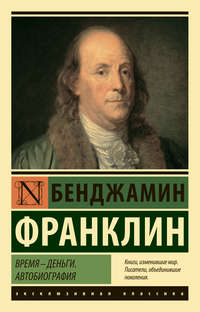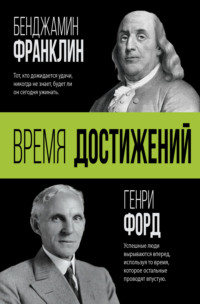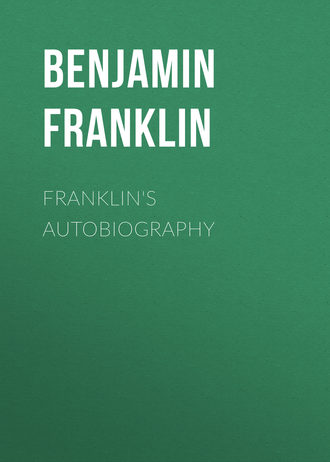 полная версия
полная версияFranklin's Autobiography
During my brother's confinement, which I resented a good deal, notwithstanding our private differences, I had the management of the paper; and I made bold to give our rulers some rubs in it, which my brother took very kindly, while others began to consider me in an unfavorable light, as a young genius that had a turn for libeling and satire. My brother's discharge was accompanied with an order of the House (a very odd one) that James Franklin should no longer print the paper called the "New England Courant."
There was a consultation held in our printing house among his friends what he should do in this case. Some proposed to evade the order by changing the name of the paper; but my brother seeing inconveniences in that, it was finally concluded on, as a better way, to let it be printed for the future under the name of Benjamin Franklin; and to avoid the censure of the Assembly that might fall on him as still printing it by his apprentice, the contrivance was that my old indenture should be returned to me, with a full discharge on the back of it, to be shown on occasion; but to secure to him the benefit of my service I was to sign new indentures for the remainder of the term, which were to be kept private. A very flimsy scheme it was; however, it was immediately executed, and the paper went on accordingly under my name for several months.
At length, a fresh difference arising between my brother and me, I took upon me to assert my freedom, presuming that he would not venture to produce the new indentures. It was not fair in me to take this advantage, and this I therefore reckon one of the first errata 37 of my life; but the unfairness of it weighed little with me when under the impressions of resentment for the blows his passion too often urged him to bestow upon me, though he was otherwise not an ill-natured man. Perhaps I was too saucy and provoking.
When he found I would leave him, he took care to prevent my getting employment in any other printing house of the town, by going round and speaking to every master, who accordingly refused to give me work. I then thought of going to New York, as the nearest place where there was a printer; and I was rather inclined to leave Boston when I reflected that I had already made myself a little obnoxious to the governing party, and, from the arbitrary proceedings of the Assembly in my brother's case, it was likely I might, if I stayed, soon bring myself into scrapes; and, further, that my indiscreet disputations about religion began to make me pointed at with horror by good people as an infidel or atheist. I determined on the point, but, my father now siding with my brother, I was sensible that, if I attempted to go openly, means would be used to prevent me. My friend Collins, therefore, undertook to manage a little for me. He agreed with the captain of a New York sloop for my passage, under the notion of my being a young acquaintance of his that had got into trouble, and therefore I could not appear or come away publicly. So I sold some of my books to raise a little money, was taken on board privately, and, as we had a fair wind, in three days I found myself in New York, near three hundred miles from home, a boy of but seventeen, without the least recommendation to, or knowledge of, any person in the place, and with very little money in my pocket.
§ 2. SEEKS HIS FORTUNE
My inclinations for the sea were by this time worn out, or I might now have gratified them. But, having a trade, and supposing myself a pretty good workman, I offered my service to the printer in the place, old Mr. William Bradford, who had been the first printer in Pennsylvania, but removed from thence upon the quarrel of George Keith. He could give me no employment, having little to do and help enough already; but says he, "My son at Philadelphia has lately lost his principal hand, Aquila Rose, by death; if you go thither I believe he may employ you." Philadelphia was a hundred miles farther; I set out, however, in a boat for Amboy, leaving my chest and things to follow me round by sea.
In crossing the bay we met with a squall that tore our rotten sails to pieces, prevented our getting into the Kill, 38 and drove us upon Long Island. In our way, a drunken Dutchman, who was a passenger too, fell overboard. When he was sinking, I reached through the water to his shock pate, and drew him up so that we got him in again. His ducking sobered him a little, and he went to sleep, taking first out of his pocket a book, which he desired I would dry for him. It proved to be my old favorite author, Bunyan's "Pilgrim's Progress," in Dutch, finely printed on good paper, with copper cuts, a dress better than I had ever seen it wear in its own language. I have since found that it has been translated into most of the languages of Europe, and suppose it has been more generally read than any other book, except, perhaps, the Bible. Honest John 39 was the first that I know of who mixed narration and dialogue; a method of writing very engaging to the reader, who in the most interesting parts finds himself, as it were, brought into the company and present at the discourse. Defoe [n] in his "Crusoe," his "Moll Flanders," "Religious Courtship," "Family Instructor," and other pieces, has imitated it with success; and Richardson has done the same in his "Pamela," etc.
When we drew near the island we found it was at a place where there could be no landing, there being a great surf on the stony beach. So we dropped anchor, and swung round toward the shore. Some people came down to the water edge and hallooed to us, as we did to them; but the wind was so high and the surf so loud that we could not hear so as to understand each other. There were canoes on the shore, and we made signs, and hallooed that they should fetch us; but they either did not understand us or thought it impracticable, so they went away, and night coming on, we had no remedy but to wait till the wind should abate. In the mean time, the boatman and I concluded to sleep if we could, and so crowded into the scuttle with the Dutchman, who was still wet, and the spray beating over the head of our boat leaked through to us, so that we were soon almost as wet as he. In this manner we lay all night, with very little rest; but the wind abating the next day, we made a shift to reach Amboy before night, having been thirty hours on the water, without victuals, or any drink but a bottle of filthy rum, the water we sailed on being salt.
In the evening I found myself very feverish, and went in to bed; but, having read somewhere that cold water, drunk plentifully, was good for a fever, I followed the prescription, sweat plentifully most of the night, my fever left me, and in the morning, crossing the ferry, I proceeded on my journey on foot, having fifty miles to Burlington, 40 where I was told I should find boats that would carry me the rest of the way to Philadelphia.
It rained very hard all the day. I was thoroughly soaked, and by noon a good deal tired, so I stopped at a poor inn, where I stayed all night, beginning now to wish that I had never left home. I cut so miserable a figure, too, that I found, by the questions asked me, I was suspected to be some runaway servant and in danger of being taken up on that suspicion. However, I proceeded the next day, and got in the evening to an inn, within eight or ten miles of Burlington, kept by one Dr. Brown. He entered into conversation with me while I took some refreshment, and, finding I had read a little, became very sociable and friendly. Our acquaintance continued as long as he lived. [n] He had been, I imagine, an itinerant doctor; for there was no town in England, or country in Europe, of which he could not give a very particular account. He had some letters, 41 and was ingenious, but much of an unbeliever, and wickedly undertook, some years after, to travesty the Bible in doggerel verse, as Cotton had done Virgil. By this means he set many of the facts in a very ridiculous light, and might have hurt weak minds if his work had been published; but it never was.
At his house I lay that night, and the next morning reached Burlington, but had the mortification to find that the regular boats were gone a little before my coming, and no other expected to go before Tuesday, this being Saturday; wherefore I returned to an old woman in the town of whom I had bought gingerbread to eat on the water, and asked her advice. She invited me to lodge at her house till a passage by water should offer; and, being tired with my foot traveling, I accepted the invitation. She, understanding I was a printer, would have had me stay at that town and follow my business, being ignorant of the stock necessary to begin with. She was very hospitable, gave me a dinner of ox cheek with great good will, accepting only of a pot of ale in return; and I thought myself fixed till Tuesday should come. However, walking in the evening by the side of the river, a boat came by, which I found was going toward Philadelphia, with several people in her. They took me in, and, as there was no wind, we rowed all the way, and about midnight, not having yet seen the city, some of the company were confident we must have passed it, and would row no farther. The others knew not where we were; so we put toward the shore, got into a creek, and landed near an old fence, with the rails of which we made a fire, the night being cold, in October, and there we remained till daylight. Then one of the company knew the place to be Cooper's Creek, a little above Philadelphia, which we saw as soon as we got out of the creek, and arrived there about eight or nine o'clock on the Sunday morning, and landed at the Market Street wharf.
I have been the more particular in this description of my journey, and shall be so of my first entry into that city, that you may in your mind compare such unlikely beginnings with the figure I have since made there. I was in my working dress, my best clothes being to come round by sea. I was dirty from my journey; my pockets were stuffed out with shirts and stockings, and I knew no soul, nor where to look for lodging. I was fatigued with traveling, rowing, and want of rest; I was very hungry; and my whole stock of cash consisted of a Dutch dollar and about a shilling in copper. 42 The latter I gave the people of the boat for my passage, who at first refused it, on account of my rowing; but I insisted on their taking it, a man being sometimes more generous when he has but a little money than when he has plenty, perhaps through fear of being thought to have but little.
Then I walked up the street, gazing about, till near the market house I met a boy with bread. I had made many a meal on bread, and, inquiring where he got it, I went immediately to the baker's he directed me to, in Second Street, and asked for biscuit, intending such as we had in Boston; but they, it seems, were not made in Philadelphia. Then I asked for a threepenny loaf, and was told they had none such. So not considering or knowing the difference of money and the greater cheapness, nor the names of his bread, I bade him give me threepenny worth of any sort. He gave me, accordingly, three great puffy rolls. I was surprised at the quantity, but took it, and, having no room in my pockets, walked off with a roll under each arm, and eating the other. Thus I went up Market Street as far as Fourth Street, passing by the door of Mr. Read, my future wife's father; when she, standing at the door, saw me, and thought I made, as I certainly did, a most awkward, ridiculous appearance. Then I turned and went down Chestnut Street and part of Walnut Street, eating my roll all the way, and, coming round, found myself again at Market Street wharf, near the boat I came in, to which I went for a draught of the river water; and, being filled with one of my rolls, gave the other two to a woman and her child that came down the river in the boat with us, and were waiting to go farther.
Thus refreshed, I walked again up the street, which by this time had many clean-dressed people in it, who were all walking the same way. I joined them, and thereby was led into the great meetinghouse of the Quakers near the market. 43 I sat down among them, and, after looking round awhile and hearing nothing said, being very drowsy through labor and want of rest the preceding night, I fell fast asleep, and continued so till the meeting broke up, when one was kind enough to rouse me. This was, therefore, the first house I was in, or slept in, in Philadelphia.
Walking down again toward the river, and looking in the faces of people, I met a young Quaker man, whose countenance I liked, and, accosting him, requested he would tell me where a stranger could get lodging. We were then near the sign of the Three Mariners. "Here," says he, "is one place that entertains strangers, but it is not a reputable house; if thee wilt walk with me I'll show thee a better." He brought me to the Crooked Billet, in Water Street. Here I got a dinner, and while I was eating it several sly questions were asked me, as it seemed to be suspected from my youth and appearance that I might be some runaway.
After dinner my sleepiness returned; and, being shown to a bed, I lay down without undressing and slept till six in the evening, was called to supper, went to bed again very early, and slept soundly till next morning. Then I made myself as tidy as I could, and went to Andrew Bradford the printer's. I found in the shop the old man, his father, whom I had seen at New York, and who, traveling on horseback, had got to Philadelphia before me. He introduced me to his son, who received me civilly, and gave me a breakfast, but told me he did not at present want a hand, being lately supplied with one; but there was another printer in town, lately set up, one Keimer, who, perhaps, might employ me; if not, I should be welcome to lodge at his house, and he would give me a little work to do now and then till fuller business should offer.
The old gentleman said he would go with me to the new printer; and when we found him, "Neighbor," says Bradford, "I have brought to see you a young man of your business; perhaps you may want such a one." He asked me a few questions, put a composing stick 44 in my hand to see how I worked, and then said he would employ me soon, though he had just then nothing for me to do; and, taking old Bradford, whom he had never seen before, to be one of the townspeople that had a good will for him, he entered into a conversation on his present undertaking and prospects; while Bradford, not discovering that he was the other printer's father, on Keimer's saying he expected soon to get the greatest part of the business into his own hands, drew him on by artful questions, and starting little doubts, to explain all his views, what interest he relied on, and in what manner he intended to proceed. I, who stood by and heard all, saw immediately that one of them was a crafty old sophister, 45 and the other a mere novice. Bradford left me with Keimer, who was greatly surprised when I told him who the old man was.
Keimer's printing house, I found, consisted of an old shattered press and one small, worn-out font of English, 46 which he was then using himself, composing an elegy on Aquila Rose, before mentioned, an ingenious young man of excellent character, much respected in the town, clerk of the Assembly, and a pretty poet. Keimer made verses too, but very indifferently. He could not be said to write them, for his manner was to compose them in the types, directly out of his head. So, there being no copy, 47 but one pair of cases, and the elegy likely to require all the letters, no one could help him. I endeavored to put his press (which he had not yet used and of which he understood nothing) into order fit to be worked with; and, promising to come and print off his elegy as soon as he should have got it ready, I returned to Bradford's, who gave me a little job to do for the present, and there I lodged and dieted. 48 A few days after Keimer sent for me to print off the elegy. And now he had got another pair of cases, and a pamphlet to reprint, on which he set me to work.
These two printers I found poorly qualified for their business. Bradford had not been bred to it, and was very illiterate; and Keimer, though something of a scholar, was a mere compositor, knowing nothing of press work. He had been one of the French prophets, 49 and could act their enthusiastic agitations. At this time he did not profess any particular religion, but something of all on occasion, was very ignorant of the world, and had, as I afterward found, a good deal of the knave in his composition. He did not like my lodging at Bradford's while I worked with him. He had a house, indeed, but without furniture, so he could not lodge me; but he got me a lodging at Mr. Read's, before mentioned, who was the owner of his house; and, my chest and clothes being come by this time, I made rather a more respectable appearance in the eyes of Miss Read than I had done when she first happened to see me eating my roll in the street.
I began now to have some acquaintance among the young people of the town that were lovers of reading, with whom I spent my evenings very pleasantly; and, gaining money by my industry and frugality, I lived very agreeably, forgetting Boston as much as I could, and not desiring that any there should know where I resided, except my friend Collins, who was in my secret and kept it when I wrote to him. At length an incident happened that sent me back again much sooner than I had intended. I had a brother-in-law, Robert Holmes, master of a sloop that traded between Boston and Delaware. He being at Newcastle, forty miles below Philadelphia, heard there of me, and wrote me a letter, mentioning the concern of my friends in Boston at my abrupt departure, assuring me of their good will to me and that everything would be accommodated to my mind if I would return, to which he exhorted me very earnestly. I wrote an answer to his letter, thanked him for his advice, but stated my reasons for quitting Boston fully and in such a light as to convince him I was not so wrong as he had apprehended.
Sir William Keith, governor of the province, was then at Newcastle; and Captain Holmes, happening to be in company with him when my letter came to hand, spoke to him of me and showed him the letter. The governor read it, and seemed surprised when he was told my age. He said I appeared a young man of promising parts, and therefore should be encouraged; the printers at Philadelphia were wretched ones; and, if I would set up there, he made no doubt I should succeed; for his part, he would procure me the public business, and do me every other service in his power. This my brother-in-law afterward told me in Boston, but I knew as yet nothing of it when, one day, Keimer and I being at work together near the window, we saw the governor and another gentleman (which proved to be Colonel French of Newcastle), finely dressed, come directly across the street to our house, and heard them at the door.
Keimer ran down immediately, thinking it a visit to him; but the governor inquired for me, came up, and with a condescension and politeness I had been quite unused to, made me many compliments, desired to be acquainted with me, blamed me kindly for not having made myself known to him when I first came to the place, and would have me away with him to the tavern, where he was going with Colonel French to taste, as he said, some excellent Madeira. I was not a little surprised, and Keimer stared like a pig poisoned. I went, however, with the governor and Colonel French to a tavern at the corner of Third Street, and over the Madeira he proposed my setting up my business, laid before me the probabilities of success, and both he and Colonel French assured me I should have their interest and influence in procuring the public business of both governments. 50 On my doubting whether my father would assist me in it, Sir William said he would give me a letter to him, in which he would state the advantages, and he did not doubt of prevailing with him. So it was concluded I should return to Boston in the first vessel, with the governor's letter recommending me to my father. In the mean time the intention was to be kept a secret, and I went on working with Keimer as usual, the governor sending for me now and then to dine with him, a very great honor I thought it, and conversing with me in the most affable, familiar, and friendly manner imaginable.
About the end of April, 1724, a little vessel offered for Boston. I took leave of Keimer as going to see my friends. The governor gave me an ample letter, saying many flattering things of me to my father, and strongly recommending the project of my setting up at Philadelphia as a thing that must make my fortune. We struck on a shoal in going down the bay, and sprung a leak; we had a blustering time at sea, and were obliged to pump almost continually, at which I took my turn. We arrived safe, however, at Boston in about a fortnight. I had been absent seven months, and my friends had heard nothing of me; for my brother Holmes was not yet returned, and had not written about me. My unexpected appearance surprised the family; all were, however, very glad to see me, and made me welcome, except my brother. I went to see him at his printing house. I was better dressed than ever while in his service, having a genteel new suit from head to foot, a watch, and my pockets lined with near five pounds sterling in silver. He received me not very frankly, looked me all over, and turned to his work again.
The journeymen were inquisitive where I had been, what sort of a country it was, and how I liked it. I praised it much, and the happy life I led in it, expressing strongly my intention of returning to it; and one of them asking what kind of money we had there, I produced a handful of silver and spread it before them, which was a kind of raree-show 51 they had not been used to, paper being the money of Boston. Then I took an opportunity of letting them see my watch; and lastly (my brother still grum and sullen) I gave them a piece of eight 52 to drink, and took my leave. This visit of mine offended him extremely; for, when my mother some time after spoke to him of a reconciliation, and of her wishes to see us on good terms together, and that we might live for the future as brothers, he said I had insulted him in such a manner before his people that he could never forget or forgive it. In this, however, he was mistaken.
My father received the governor's letter with some apparent surprise, but said little of it to me for several days, when, Captain Holmes returning, he showed it to him, asked him if he knew Keith, and what kind of man he was, adding his opinion that he must be of small discretion to think of setting a boy up in business who wanted yet three years of being at man's estate. Holmes said what he could in favor of the project, but my father was clear in the impropriety of it, and at last gave a flat denial to it. Then he wrote a civil letter to Sir William, thanking him for the patronage he had so kindly offered me, but declining to assist me as yet in setting up, I being, in his opinion, too young to be trusted with the management of a business so important, and for which the preparation must be so expensive.
My friend and companion, Collins, who was a clerk in the post office, pleased with the account I gave him of my new country, determined to go thither also; and, while I waited for my father's determination, he set out before me by land to Rhode Island, leaving his books, which were a pretty collection of mathematics and natural philosophy, to come with mine and me to New York, where he proposed to wait for me.
My father, though he did not approve Sir William's proposition, was yet pleased that I had been able to obtain so advantageous a character from a person of such note where I had resided, and that I had been so industrious and careful as to equip myself so handsomely in so short a time; therefore, seeing no prospect of an accommodation between my brother and me, he gave his consent to my returning again to Philadelphia, advised me to behave respectfully to the people there, endeavor to obtain the general esteem, and avoid lampooning and libeling, to which he thought I had too much inclination; telling me that by steady industry and a prudent parsimony I might save enough by the time I was one and twenty to set me up; and that, if I came near the matter, he would help me out with the rest. This was all I could obtain, except some small gifts as tokens of his and my mother's love, when I embarked again for New York, now with their approbation and their blessing.


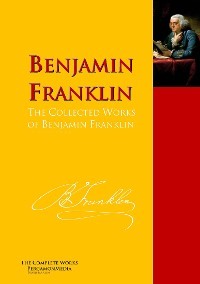
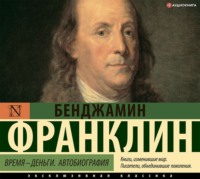

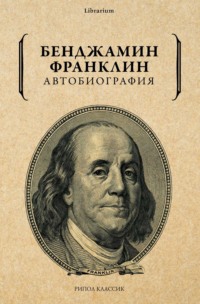
![Memoirs of Benjamin Franklin; Written by Himself. [Vol. 2 of 2]](/covers_200/24858395.jpg)
